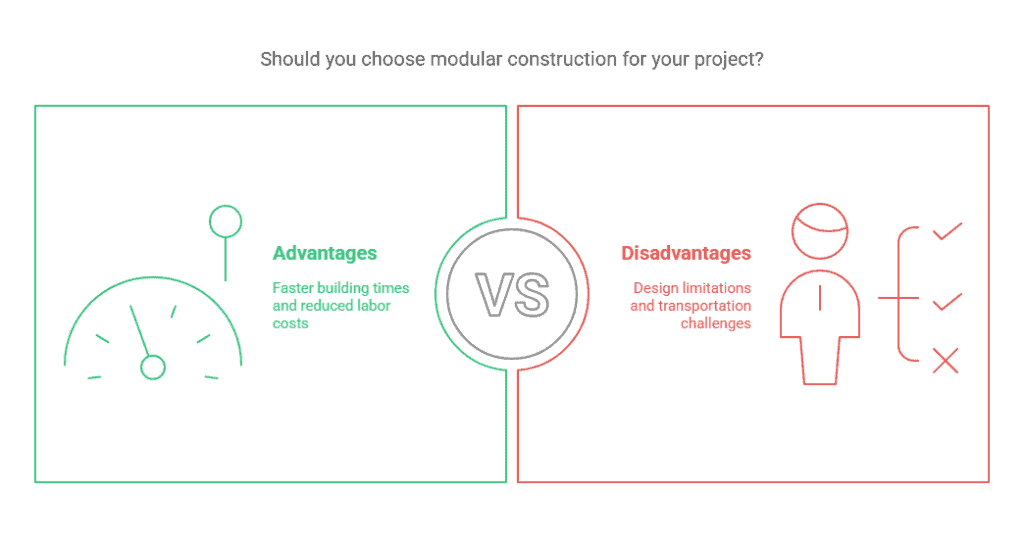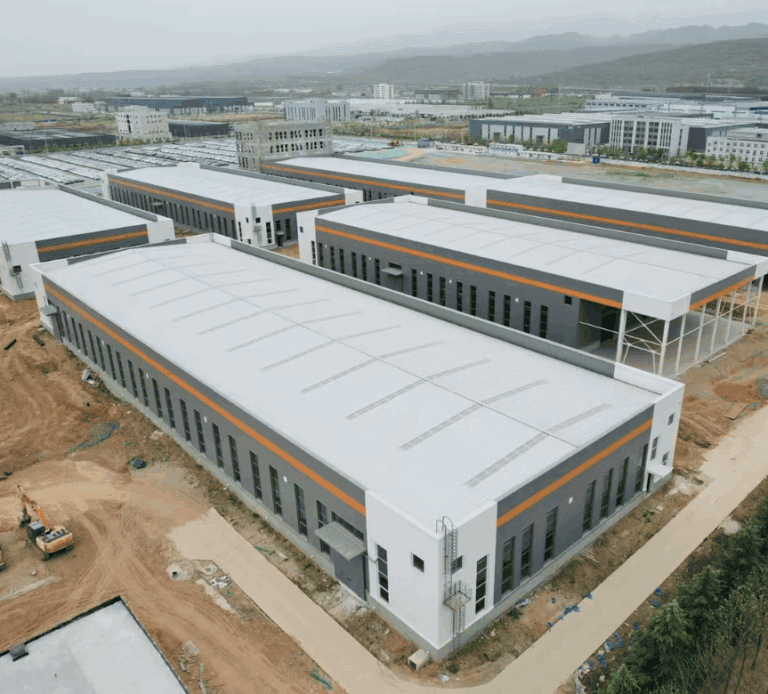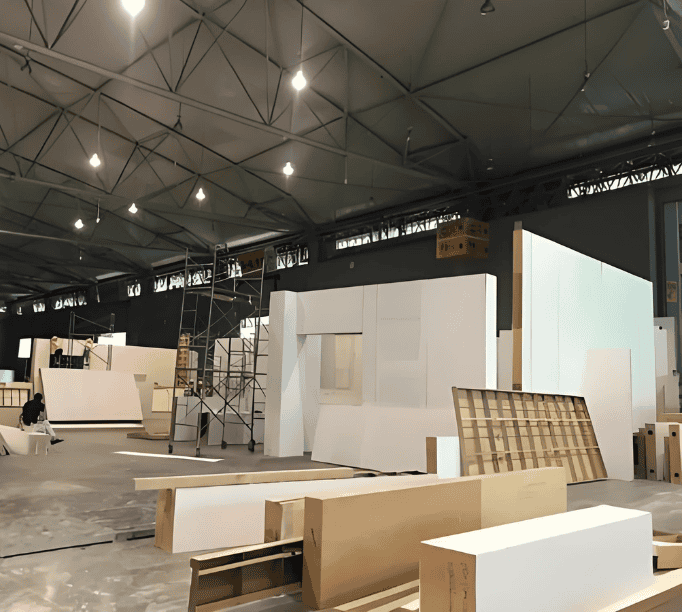Wenn Sie mit engen Terminen, Kostenüberschreitungen oder inkonsistenter Qualität im traditionellen Bauwesen konfrontiert sind, könnte modulares Bauen die Lösung sein, nach der Sie gesucht haben. In diesem Artikel gehen wir auf die wichtigsten Vorteile des modularen Bauens ein – von Zeitersparnis bis hin zu Budgetvorhersehbarkeit – und zeigen, wie es Ihnen bei der Bewältigung häufiger Herausforderungen helfen kann.
Was ist modulares Bauen und wie funktioniert es?
Modulbauweise ist ein modernes Baukonzept, bei dem die Bauteile in einer Fabrik vorgefertigt und anschließend auf der Baustelle montiert werden. Diese Methode steht im Gegensatz zur traditionellen Bauweise, bei der alles von Grund auf auf der Baustelle selbst errichtet wird.
Die Schlüsselidee hierbei ist Geschwindigkeit Und EffizienzDurch die Montage großer Gebäudeteile in einer kontrollierten Fabrikumgebung werden viele Arbeiten außerhalb der Baustelle durchgeführt. Dadurch werden Verzögerungen durch Wetter, Arbeitskräftemangel und andere unvorhersehbare Faktoren, die bei herkömmlichen Bauweisen üblich sind, reduziert.
So funktioniert der Modulbau:
- Design: Alles beginnt mit der Planung. Genau wie beim traditionellen Bauen erstellen Architekten und Ingenieure Entwürfe. Diese Entwürfe sind jedoch auf die modulare Bauweise zugeschnitten, was bedeutet, dass sie leicht in vorgefertigte Teile zerlegt werden können.
- Herstellung: Die Abschnitte oder Module des Gebäudes werden in einer Fabrik unter Verwendung der gleichen Materialien wie bei herkömmlichen Konstruktionen hergestellt, jedoch in einer kontrollierten Umgebung, wodurch eine höhere Präzision gewährleistet und Mängel minimiert werden.
- Transport und Montage: Sobald die Module fertiggestellt sind, werden sie zur vorgesehenen Baustelle transportiert. Vor Ort werden diese Module mit Kränen an ihren Platz gehoben und zur vollständigen Struktur verbunden.
- Letzte Handgriffe: Nach der Positionierung der Module ähneln die letzten Schritte denen einer herkömmlichen Bauweise. Dazu gehören Innenausbau, Sanitär- und Elektroarbeiten, die alle schnell und effizient erledigt werden können.
Warum sollten Sie über modulare Bauweise nachdenken?
Wenn es ums Bauen geht, kennen wir alle die Herausforderungen: Verzögerungen, Kostenüberschreitungen, Und Probleme mit der QualitätskontrolleDiese Probleme können zu Verzögerungen, Budgetüberschreitungen und Unzufriedenheit bei Kunden oder Mietern führen. Wenn Sie Entwickler, Auftragnehmer oder Projektmanager sind, sind Sie mit diesen Herausforderungen wahrscheinlich bestens vertraut.
Warum sollten Sie also überhaupt über modulare Bauweise nachdenken? Die einfache Antwort lautet: Sie löst viele dieser häufigen Probleme. Und so funktioniert es:
1. Schnellere Fertigstellungszeiten
Modulare Bauweise verkürzt die Projektlaufzeit. Durch die Fertigung der Module außerhalb der Baustelle in einer kontrollierten Fabrikumgebung erfolgt der Bauprozess parallel zur Baustellenvorbereitung. Das bedeutet weniger Wartezeiten und Ihr Gebäude ist bezugsfertig. Wochen oder sogar Monate schneller als mit herkömmlichen Methoden.
2. Bessere Kostenkontrolle
Modulares Bauen hilft Ihnen, Ihr Budget einzuhalten. Dank besser planbarer Zeitpläne vermeiden Sie Verzögerungskosten. Darüber hinaus reduziert der Fabrikbau Abfall und teure Nacharbeiten, wodurch Sie Material und Arbeitskosten sparen.
3. Konstante Qualität
In einer Fabrik wird alles nach präzisen Standards gebaut. Dies minimiert Fehler und garantiert eine höhere Konsistenz und eine geringere Fehlerquote im Vergleich zu herkömmlichen Baumethoden. Außerdem werden Verzögerungen durch schlechtes Wetter oder Personalmangel vermieden.
Wachsende Nachfrage und Relevanz im heutigen Markt
Die Nachfrage nach modularem Bauen wächst, und die Gründe dafür liegen auf der Hand. Da Projekte immer größer, Budgets knapper und Zeitpläne kürzer werden, suchen Bauherren nach Möglichkeiten, diesem Druck zu begegnen. Modulares Bauen ist nicht nur ein Trend – es ist eine Reaktion auf den wachsenden Bedarf an Schneller, günstiger, Und höhere Qualität Gebäude. Egal, ob Sie an Wohn-, Gewerbe- oder Industrieprojekten arbeiten, der modulare Bau bietet die Lösungen, die Sie suchen.
Mit der Weiterentwicklung des Marktes setzen immer mehr Unternehmen und Regierungsprojekte auf modulare Lösungen, um wettbewerbsfähig zu bleiben und die Nachfrage nach effizientem, nachhaltigem Bauen zu erfüllen.

Welche Vor- und Nachteile hat die Modulbauweise?
| Vorteile | Nachteile |
| Schnellere Konstruktion | Transport- und Logistikkosten |
| Kostengünstig | Designbeschränkungen |
| Qualität und Konsistenz | Standortbeschränkungen |
| Nachhaltigkeit | Wahrnehmung und Marktakzeptanz |
| Flexibilität und Anpassung | Hoher Planungsaufwand im Vorfeld |
| Verbesserte Sicherheit | Herausforderungen im Zusammenhang mit örtlichen Vorschriften und Genehmigungen |
| Weniger Störungen auf der Baustelle | Begrenzte Änderungen vor Ort |
| Skalierbarkeit und Wiederholbarkeit | Abhängigkeit von der Lieferkette |
| Einfachere Dokumentation der Qualitätskontrolle |
Weiterführende Literatur: Vor- und Nachteile von Fertighäusern
Wie viel Zeit lässt sich durch modulares Bauen sparen?
Durch die modulare Konstruktion können Sie Ihre Projektzeit verkürzen, indem 30% bis 50%, was bedeutet, dass Sie sparen könnten Wochen oder sogar Monate im Vergleich zu herkömmlichen Methoden. Bei größeren Projekten ist diese Zeitersparnis ein großer Vorteil.
Traditionelle Bauweise vs. modulare Bauweise
Traditionelle Bauweise folgt in der Regel einer sequentieller Prozess— zuerst das Fundament, dann das Gebäude und schließlich die Fertigstellung. Dies kann zu Verzögerungen durch Wetter oder andere unerwartete Probleme führen. Mit modularer Aufbau, Module werden außerhalb der Baustelle gebaut, während gleichzeitig die Baustellenarbeiten stattfinden. Dies paralleler Ansatz verkürzt den Gesamtzeitrahmen erheblich.
Auswirkungen auf den ROI und die Leasing-/Verkaufszeitpläne
Schnellere Fertigstellung bedeutet, dass Ihr Gebäude bereit ist für Leasing oder Verkauf früher, was sich direkt auf ROIDurch frühzeitigen Bezug können Mieteinnahmen oder Verkaufserlöse schneller generiert werden und die Finanzierungskosten sinken. In wettbewerbsintensiven Märkten verschafft Ihnen das einen großen Vorteil.
Wie sieht es mit den Kosten aus – ist modulares Bauen wirklich günstiger?
Unter Kostengesichtspunkten erweist sich die modulare Bauweise auf lange Sicht häufig als wirtschaftlicher. So wird dies erreicht:
Anschaffungskosten vs. langfristige Einsparungen
Während die Anschaffungskosten des modularen Bauens kann dem traditionellen Bauen ähneln, die langfristige Einsparungen sind erheblich. Durch die externe Fertigung von Modulen reduzieren Sie die Arbeitskosten vor Ort, Abfall und Nacharbeit. Da ein Großteil der Arbeiten in einer kontrollierten Fabrikumgebung durchgeführt wird, sinkt das Risiko von Fehlern und Verzögerungen erheblich. Dies führt zu Einsparungen bei Material, Arbeitsaufwand und reduziert den Bedarf an kostspieligen Korrekturen im späteren Projektverlauf.
Budgetvorhersehbarkeit und weniger Änderungsaufträge
Einer der wichtigsten finanziellen Vorteile des modularen Bauens ist Budgetvorhersehbarkeit. Da ein Großteil der Arbeit im Werk vorgeplant und ausgeführt wird, sind unerwartete Kosten weitaus seltener. Es gibt auch weniger Bedarf an Änderungsaufträgen, was die Kosten in die Höhe treiben und Projekte im traditionellen Bauwesen verzögern kann.
Ist modulares Bauen besser als herkömmliche Methoden?
Ja, modulare Bauweise kann liefern überlegene Qualität im Vergleich zu herkömmlichen Baumethoden. Hier ist der Grund:
Fabrikkontrollierte Umgebung = Präzision und Konsistenz
In einer Fabrik wird alles in einer kontrollierte Umgebung. Das heisst höhere Präzision Und konsistente Ergebnisse. Die kontrollierten Bedingungen tragen dazu bei, Variablen wie Wetter oder Herausforderungen vor Ort zu eliminieren, die die Qualität bei herkömmlichen Bauweisen beeinträchtigen können.
QA/QC-Maßnahmen während der Off-Site-Fertigung
Qualitätssicherung (QA) und Qualitätskontrolle (QC) spielen im modularen Bau eine zentrale Rolle. Fabrikproduktion folgt strengen Standards und führt während des gesamten Prozesses regelmäßige Kontrollen durch. Dadurch wird sichergestellt, dass jedes Modul die erforderlichen Spezifikationen erfüllt, bevor es das Werk verlässt.
Weniger menschliche Fehler und wetterbedingte Defekte
Menschliche Fehler und Wetterverzögerungen sind die Hauptursachen für Mängel im traditionellen Bauwesen. Durch den Bau von Modulen außerhalb des Standorts, in einer kontrollierten Umgebung, Fehler werden minimiert Und wetterbedingte Probleme wie Regen oder extreme Hitze den Bauprozess nicht mehr beeinträchtigen. Dies führt zu einer hochwertigere Verarbeitung.
Weiterführende Literatur: Traditionelle oder modulare Konstruktion
Funktioniert es für meinen Projekttyp?
Modulare Bauweise ist unglaublich vielseitig und eignet sich für eine Vielzahl von Projekten. So könnte sie Ihren Anforderungen entsprechen:
Arten von Projekten, bei denen modulare Bauweise floriert
Der modulare Aufbau ist ideal für Projekte, die schnell und effizient umgesetzt werden müssen, darunter:
- Wohnungen und Wohngebäude
- Hotels und Unterkünfte
- Büros und Gewerbeflächen
- Schulen und Bildungseinrichtungen
Diese Art von Projekten profitiert vom modularen Bauen, da sie oft enge Termin- und Kostenvorgaben einhalten müssen. Modulare Bauweise ermöglicht Ihnen die schnelle Errichtung hochwertiger Gebäude bei gleichzeitiger Budgetkontrolle.
Strukturelle Flexibilität: Niedrige, mittlere und stapelbare Designs
Modulare Gebäude sind nicht auf einstöckige Designs beschränkt. Sie können angepasst werden für:
- Niedrige Leibhöhe (eingeschossig)
- Mittlere Leibhöhe (mehrere Geschichten)
- Stapelbare Designs (mehrere Module gestapelt, um höhere Strukturen zu schaffen)
Diese Flexibilität ermöglicht den Einsatz der Modulbauweise in verschiedenen Gebäudetypen, vom einfachen einstöckigen Bürogebäude bis hin zu mehrstöckigen Wohnkomplexen oder Hotels.
Anpassungs- und Skalierbarkeitsoptionen
Während modulare Gebäude oft mit Standarddesigns in Verbindung gebracht werden, können sie individuell um spezifischen Anforderungen gerecht zu werden. Ob Sie spezielle Grundrisse, Raumkonfigurationen oder bestimmte Materialien benötigen, der modulare Bau kann sich an Ihre Vision anpassen.
Zusätzlich, Skalierbarkeit ist ein großer Vorteil. Wenn Sie das Gebäude in Zukunft erweitern müssen, können Sie problemlos und ohne größere Störungen oder Verzögerungen weitere Module zur bestehenden Struktur hinzufügen.
Kurz gesagt: Modulbau ist sehr flexibel und anpassungsfähig, was es zu einer praktikablen Option für eine Vielzahl von Projekttypen macht. Ob Sie ein kleines Büro oder einen mehrstöckigen Wohnkomplex benötigen, es kann Ihre Anforderungen erfüllen.

Welche Vorteile bietet die Modulbauweise hinsichtlich Umwelt und Compliance?
Die modulare Bauweise bietet wichtige Vorteile hinsichtlich Umwelt und Compliance:
- Weniger Abfall: Die Materialien werden in der Fabrik präzise zugeschnitten, wodurch der Abfall im Vergleich zur herkömmlichen Konstruktion minimiert wird.
- Weniger Lieferungen: Weniger Fahrten zur Baustelle reduzieren die Transportemissionen und den Kraftstoffverbrauch.
- Weniger Störungen vor Ort: Durch die Bauausführung außerhalb des Geländes kommt es zu weniger Lärm, Staub und Störungen in der Umgebung, insbesondere in städtischen oder ökologisch sensiblen Gebieten.
- Grünes Bauen: Modulares Bauen ist grundsätzlich umweltfreundlicher. Die werkseitig kontrollierte Umgebung ermöglicht einen effizienten Materialeinsatz, Energieeinsparungen und erleichtert die Einhaltung von LEED- oder anderen Green-Building-Standards.
- Codes und Standards: Beim Modulbau gelten die gleichen Bauvorschriften und Brandschutzstandards wie beim herkömmlichen Bauen. Die kontrollierte Fabrikumgebung ermöglicht eine hervorragende Qualitätskontrolle und die konsequente Einhaltung von Sicherheits- und gesetzlichen Standards.
Wer macht das bereits – und ist erfolgreich?
Modulares Bauen ist nicht nur ein Konzept – es wird weltweit eingesetzt, um reale Herausforderungen in einer Vielzahl von Branchen zu lösen. Hier sind einige unserer herausragenden Projekte:
1. Kupferverarbeitungsanlage, Kasachstan
Da das Projekt in einer Region liegt, die für extreme Kälte und starke Winde bekannt ist, war eine Struktur erforderlich, die Erdbebenrisiken und hohen Schneelasten standhalten konnte.
Um den Arbeitsaufwand vor Ort zu reduzieren und wetterbedingte Verzögerungen zu minimieren, wurde ein modulares Stahlsystem gewählt, das wind- und erdbebensicher ist. Das Ergebnis: präzise Installation, sicherer Betrieb und ein konsistenter Zeitplan.
2. Wärmekraftwerk, Philippinen
Feuchtigkeit und hohe Temperaturen machten die Stabilität des Kesselrahmens zu einem vorrangigen Anliegen. Die Modulbauweise bot eine praktische Lösung: Hochfeste, vorbehandelte Stahlmodule wurden außerhalb der Baustelle gefertigt, wodurch die Feuchtigkeitsbelastung während der Bauphase reduziert wurde.
Dieser Ansatz verkürzte die Bauzeit erheblich und ermöglichte eine Struktur, die auch unter rauen Klimabedingungen langfristig eine hohe Leistung beibehält.
3. E-Commerce-Industriestandort Zhengding, China
Geschwindigkeit war alles. Das Projekt erforderte eine schnelle Lieferung, eine effiziente Raumnutzung und die Einhaltung der Erdbebenvorschriften.
Das Team verwendete ein modulares Portalrahmensystem, um das Layout zu optimieren, die Zeit vor Ort zu verkürzen und eine lange Lebensdauer zu gewährleisten. Das Projekt wurde vorzeitig abgeschlossen und zeichnete sich durch eine verbesserte Raumausnutzung und ein geringeres Risiko aus.
Möchten Sie mehr erfahren über unsere erfolgreichen Projekte? Klicken Sie hier, um es auszuprobieren!
Ist modulare Bauweise das Richtige für Sie?
Ist modulares Bauen also die richtige Wahl für Ihr Projekt? So finden Sie die richtige Lösung:
1. Ist Ihr Projekt zeitkritisch?
Der modulare Aufbau beschleunigt den Prozess, indem er Baustellenarbeiten und Modulfertigung gleichzeitig geschehen. Wenn die Einhaltung enger Termine wichtig ist, kann Ihnen die modulare Konstruktion helfen, Schneller, wodurch Ihr Projekt schneller einsatzbereit ist.
2. Benötigen Sie Kostenkontrolle?
Modulare Bauweise bietet Budgetvorhersehbarkeit. Durch weniger Verzögerungen, reduzierten Arbeitsaufwand und minimierten Materialabfall bleibt Ihr Projekt im Budget und das Risiko von Kostenüberschreitungen wird verringert.
3. Legen Sie Wert auf Qualität und Beständigkeit?
Der modulare Aufbau, der in einer kontrollierten Fabrikumgebung durchgeführt wird, garantiert gleichbleibende Qualität und minimiert Mängel im Vergleich zu herkömmlichen Methoden, bei denen die Standortbedingungen zu Schwankungen führen können.
4. Ist Nachhaltigkeit für Ihr Projekt wichtig?
Modulare Konstruktion reduziert Materialabfall, Transportemissionenund erleichtert das Erreichen Standards für umweltfreundliches Bauen wie LEED-Zertifizierung, die Nachhaltigkeitsziele unterstützen.
5. Haben Sie ein individuelles oder komplexes Design?
Die modulare Bauweise bietet ausreichend Flexibilität für weitgespannte Konstruktionen, mehrstöckige Gebäude oder einzigartige Strukturen. Darüber hinaus erleichtert sie bei Bedarf eine zukünftige Erweiterung.
6. Unterliegt Ihr Projekt strengen behördlichen Auflagen?
Module werden so konstruiert, dass sie den gleichen Bauvorschriften und Sicherheitsstandards entsprechen wie herkömmliche Gebäude, wodurch von Anfang an Konformität und zuverlässige Sicherheit gewährleistet sind.
Wenn Ihr Projekt Geschwindigkeit, Kostenkontrolle, Qualität, Und Nachhaltigkeit, könnte die modulare Bauweise die perfekte Wahl sein. Sie eignet sich ideal für eine Vielzahl von Entwicklungen, die sowohl Gewerbeflächen als auch Wohngebäude umfassen.
Nutzen Sie das Potenzial der Modulbauweise für Ihr nächstes
Bei SteelPRO PEB sind wir spezialisiert auf modulare Lösungen Die unübertroffene Flexibilität, Stärke und Effizienz bieten. Wenn Sie bereit sind, Ihr Projekt zu verbessern und Ihren Bauprozess zu optimieren, kontaktieren Sie uns noch heute. Wir zeigen Ihnen, wie unsere modularen Lösungen Ihnen Zeit, Geld und Aufwand sparen – und gleichzeitig die gewünschten Ergebnisse liefern.

